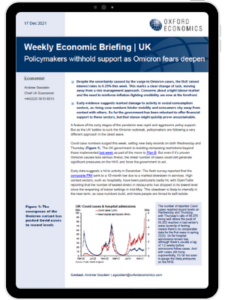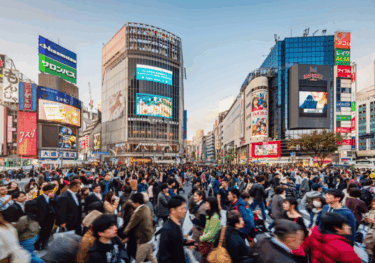Policymakers in the UK withhold support as Omicron fears deepen

Despite the uncertainty caused by the surge in Omicron cases, the BoE raised interest rates to 0.25% this week. This marks a clear change of tack, moving away from a risk management approach. Concerns about a tight labour market and the need to reinforce inflation-fighting credibility are now at the forefront. Early evidence suggests marked damage to activity in social consumption sectors, as rising case numbers hinder mobility and consumers shy away from contact with others. So far the government has been reluctant to offer financial support to these sectors, but that stance might quickly prove unsustainable.
What you will learn:
- The UK government is resisting reimposing restrictions beyond
those implemented last week as part of the move to Plan B. But even if it’s proven Omicron causes less serious illness, the sheer number of cases could still generate significant pressures on the NHS and force the government to act. - Early data suggests a hit to activity in December. The flash survey reported that the composite PMI sank to a 10-month low due to a marked slowdown in services.
- The MPC’s justification for hiking rates centred on the tightness of the labour market, with another strong release this week deemed enough to fulfil the criteria it had previously set for tightening policy.
Tags:
Related research

Post
APAC Key Themes 2026: Paybacks, policy offsets and trade
We believe APAC will remain the strongest global performer in 2026. However, the growth trajectory will likely be more uneven than in past cycles.
Find Out More
Post
Japan’s fiscal policy will remain loose, which increases risks to debt sustainabilit
We've changed our fiscal outlook for Japan in our December forecast round. We now expect the new government to set a primary deficit close to that of 2024, at 2%-3% of GDP for 2025-2027, instead of restoring a balanced budget by taking advantage of strong tax revenue. We assume higher bond yields will force the government to take measures to reduce the deficit from 2028.
Find Out More